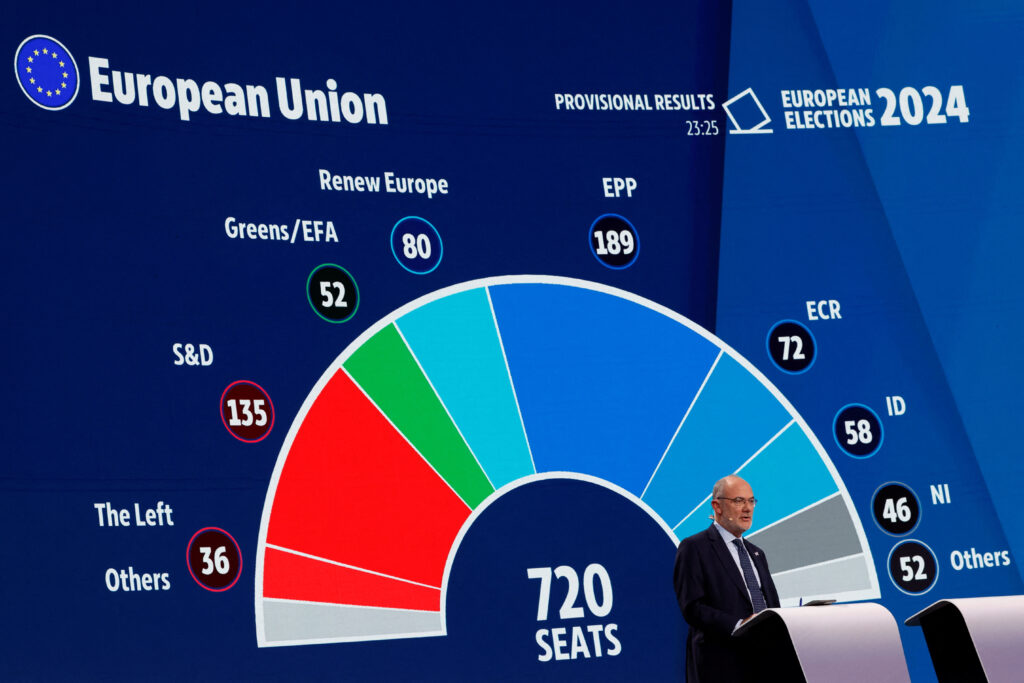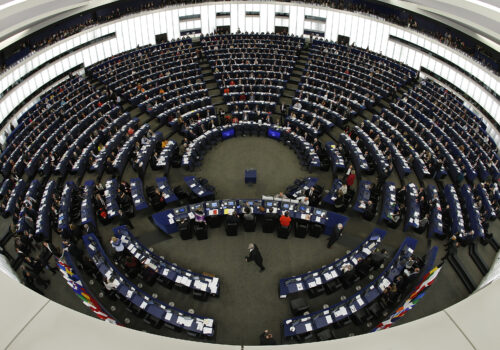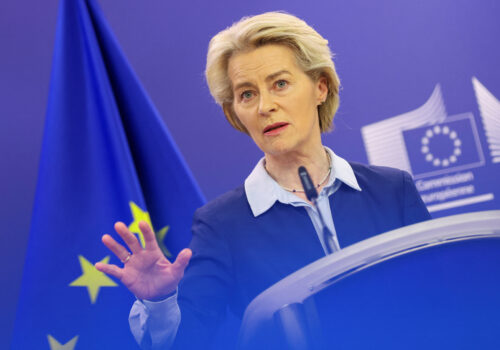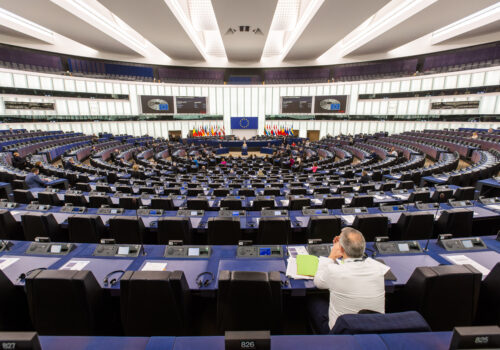JUST IN
Right is up, left is down, and the center remains. European Parliament elections across the European Union’s twenty-seven member states concluded today with gains for far-right parties but the centrist “grand coalition” nevertheless projected to emerge largely intact. Meanwhile, after his centrist party was trounced, French President Emmanuel Macron dissolved the National Assembly in a surprise move that will lead to yet more elections in the coming weeks. We turned to our Europe experts to make sense of it all and forecast what comes next.
TODAY’S EXPERT REACTION COURTESY OF
- Jörn Fleck (@JornFleck): Senior director of the Atlantic Council’s Europe Center and former European Parliament staffer
- Dave Keating (@DaveKeating): Nonresident senior fellow at the Europe Center and Brussels correspondent for France24
- Carol Schaeffer (@thencarolsaid): Nonresident senior fellow at the Europe Center
The right way to think about the right
- The first-place showing for the center-right European People’s Party (EPP) was coupled with “modest gains” for far-right parties, Jörn tells us, while “voters punished green and liberal parties.” The upshot? “Expect more complexity and protraction, but hardly a revolution in parliamentary business.”
- The big win for Marine Le Pen’s far-right National Rally party in France, which led Macron to call snap elections, generated the most headlines. But Dave points out that “there was no far-right surge overall.” In fact, he adds, “the gains were in line with the trajectory of the far right’s growth over the past two decades.”
- Digging deeper into the results, Carol notes that the far-right Alternative for Germany (AfD) “performed worse than expected,” following a scandal sparked by reports that party members had discussed deporting German citizens en masse. Meanwhile, Viktor Orbán’s party in Hungary lost ground and the Netherlands’ Party for Freedom gained seats but did not win outright—as it did in last year’s national elections. “So while the far-right made significant gains across the EU, their sweep is hardly uncontested,” she points out.
Subscribe to Fast Thinking email alerts
Sign up to receive rapid insight in your inbox from Atlantic Council experts on global events as they unfold.

Divisions or a ‘supergroup’?
- There are also many divisions within the right-wing Identity and Democracy (ID) group—which includes National Rally but recently kicked out AfD—and between ID and the less radical European Conservatives and Reformists (ECR) group, which includes Poland’s Law and Justice Party and Italian Prime Minister Giorgia Meloni’s Brothers of Italy. “It’s far from certain the political right can really act in unison in parliament to leave a significant imprint on policies from the green transition to migration and economic competitiveness,” Jörn says.
- Still, Dave predicts that when members of the European Parliament form groups in the coming weeks, “many of the new undeclared or nonaligned MEPs are likely to join ECR and ID, which may unite into a far-right supergroup if Le Pen has her way.”
- Le Pen could further cement her influence in France and beyond during the country’s snap elections, which will take place on June 30 and July 7. A victory for the Euroskeptic National Rally “would most certainly mean a deep institutional crisis for the EU,” Jörn argues. “Much will depend on developments in France and how much certainty, consensus, and stability European leaders can project at their upcoming summits in mid and late June.”
The wild card to watch
- Where does this all leave European Commission President Ursula von der Leyen as she seeks a second five-year term? She would need to be appointed by EU national leaders and confirmed by the parliament, where her coalition has been stable. “The [von der Leyen-affiliated] EPP emerged the big winner of the 2024 election, just like they have been the big winner of every EU election for the past twenty-five years,” Dave notes. “The worst fears of the centrists . . . have not come to pass.”
- But there is “more uncertainty” now for von der Leyen’s bid, Jörn says, “because of the wild-card element” of the French snap elections, which will take place during the period when the Commission president is typically nominated and confirmed.
- It “seems unlikely” that “Macron, at the helm of the second-largest EU member state, will drive forward that process before this do-or-die campaign for his party and legacy is settled,” Jörn says.
Further reading
Mon, Apr 15, 2024
Your primer on the European Parliament elections and how they will shape the EU
Eye on Europe's elections By
As Europe heads to the polls to elect the 10th European Parliament this June, the Europe Center is breaking down the key people and issues to know.
Sun, Apr 7, 2024
Ursula von der Leyen set Europe’s ‘de-risking’ in motion. What’s the status one year later?
New Atlanticist By Jörn Fleck, Josh Lipsky, David O. Shullman
The European Commission president presented a new economic vision for the European Union’s relationship with China in March 2023.
Thu, May 9, 2024
The European Parliament is still learning its lesson from corruption scandals
New Atlanticist By
With European Parliament elections upcoming, EU institutions should codify stricter definitions of foreign influence and interference, and they should pass additional reforms to ensure transparency.
Image: The first provisional results for the European Parliament elections are announced, at the European Parliament building, in Brussels, Belgium, June 9, 2024. REUTERS/Piroschka van de Wouw



